Most of us mainly associate tiles with two rooms in the house – the kitchen and the bathroom, where, no doubt, their durable water and heatproof qualities come in handy. Yet think beyond the ordinary when it comes to using this time-honored material in your home, and you’ll be rewarded.
We know there’s a wealth of ways in which the humble tile can be used to enhance a space, so we talked to 7 interior design experts to find out about the projects in which they’ve used tile ideas more unexpectedly. From creating patterns and statement walls to zoning, it’s seriously worth considering the countless possibilities of tiling, and exactly what you want to create by introducing them.
1. Consider a fire surround
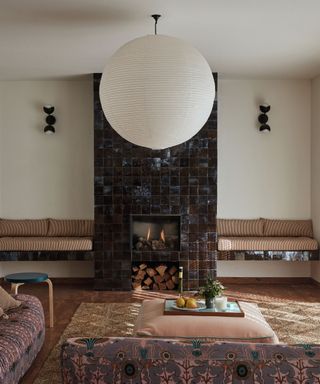
(Image credit: Chris Snook)
Historically, fireplace surrounds were often covered in decorative tiles as an inexpensive way of introducing color and pattern to a room. In this project, Sophie Rowell, from the interior design studio Côte de Folk, created a statement fireplace using coffee-brown Zellige tiles, making the fireplace a key feature of the open-plan living room.
Extra seating for guests was added on either side. ‘The tiles are remarkably dynamic, appearing silver under certain lighting conditions,’ explains Sophie. ‘The versatility is why I love working with Zellige tiles; they play with light and reflections, adding a unique element to any room’.
2. Say something personal
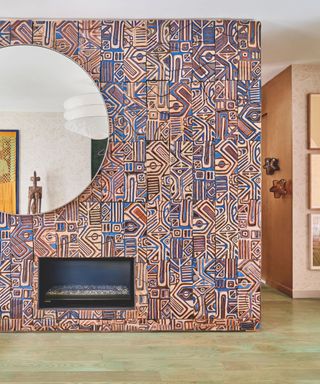
(Image credit: Pratya Jankong)
The fireplace surround that features in this Brooklyn home of artist and textile surface designer Malene Djenaba Barnett tells a deeply personal story. ‘It is called “Legacy Wall”,’ she says. ‘Each tile is hand-pressed, glazed, and fired multiple times.’
During firing, the tiles cracked, which she saw as a metaphor for the Black diaspora; her work is focused on unraveling family histories in the Caribbean. Using her fireplace surround as a canvas, she has put the pieces together to create what she describes as a new history, to show the beauty of the people and the joy around the culture
3. Design a statement wall
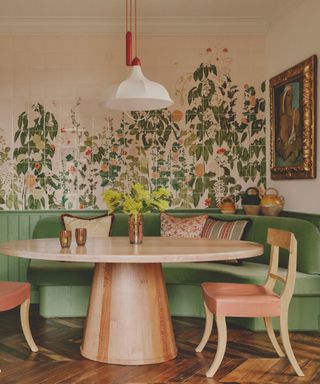
(Image credit: Kensington Leverne)
Hand-painted bespoke murals are creeping into many creative design projects these days, stamping an artisanal and individual mark on each one. Here, designer Sophie Ashby asked artist Anna Glover to work on a piece inspired by Tawaraya Sōtatsu, picking out flowers and details her client loved.
It started with hand-painted botanicals in gouache and watercolor, which Anna then gave digitally to the team at Balineum. ‘We applied a tile grid overlay and printed an artwork outline at a one-to-one scale then painstakingly hand-painted the details over every tile,’ explains Sarah Watson, founder of Balineum. ‘It took months.’
4. Introduced a bar area
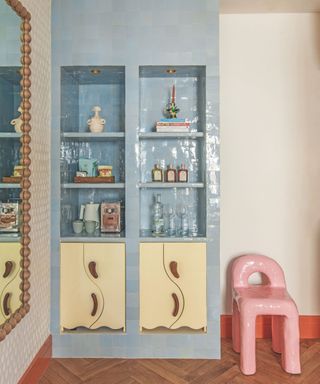
(Image credit: Karel Balas)
Tiled areas are naturally cooling, which is why, long before the advent of the fridge, pantries of country houses had stone shelves for storing cheese and other food items that needed to be kept cool.
Architect and interior designer Dorothée Meilichzon of Chzon was inspired to use pale blue zellige tiles in a similar way at the Hotel Montesol in Ibiza. ‘Tiles are an important feature in this hotel,’ she explains. ‘We have used traditional zelliges to wrap the niches of the mini bars in a range of colors.’
5. Incorporate a tiled panel somewhere unexpected
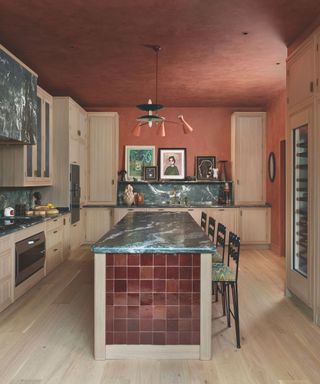
(Image credit: Darren Chung)
A standout feature in this kitchen designed by Martin Moore in collaboration with Studio Vero is the striking tiled island. Inspired by the opulent designs of grand European cafe bars, the tiles, sourced from Habibi Interiors, bring a touch of glamour to the room – something not often found in a kitchen environment.
‘We wanted this to be a place to spend time with the same capacity to showcase personality as any other room in the home,’ say Studio Vero co-founders Romanos Brihi and Venetia Rudebeck.
6. Delineate a bath ‘zone’ in the bedroom
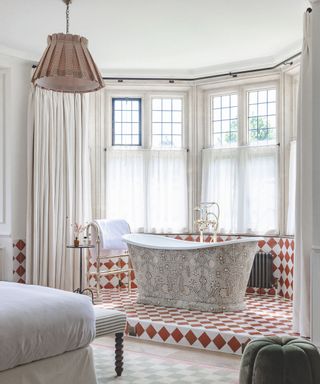
(Image credit: Owen Gale)
Baths in bedrooms are increasingly popular but it is important to zone the area around a bath for practical reasons. Here, red-and-white checked tiles from Mosaic Factory define the bathing area in this bedroom suite in the Kin House Hotel.
‘The tiles wonderfully complement the bespoke chequerboard rug we collaborated on with Pelican House,’ says Lucy Barlow, creative director of interior design studio Barlow & Barlow.
7. Create an interesting pattern
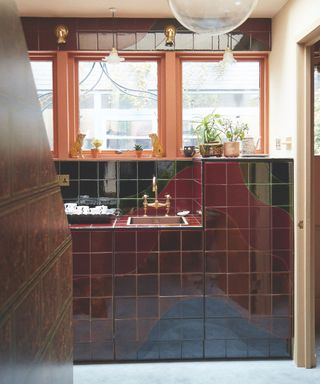
(Image credit: Billal Taright)
Tiled countertops in kitchens and bathrooms were big news in the 1980s as a way of introducing color and texture to a space, that was cheaper than using marble. Interior designer Rachel Chudley has taken the approach several steps further by creating a modernist-inspired tile wave across all the kitchen cabinets and surfaces and the walls behind.
‘The full mural was designed to depict scenes from the clients’ house,’ says Rachel. ‘Each tile was hand-painted by Balineum’s incredible bespoke team and came with a crazy lay-by-numbers plan for the installation. It was a remarkable endeavor and a testament to the joy we find in decorating.
There are many considerations when it comes to using tiles in a decor scheme. Selecting is a balancing act between creative decisions and more practical choices. Tiling a small but unexpected area can have a huge impact. If the budget can stretch a little further, an inbuilt shelving unit or fire surround is both practical and aesthetic. What’s certain is that it’s worth thinking outside the box when it comes to this humble and timeless method of surface-covering.
The versatility of tiles goes beyond just the kitchen and bathroom. Interior design experts have found innovative ways to use tiles in home decor projects. From creating statement fire surrounds to personal legacy walls, there are endless possibilities. Hand-painted murals, tiled bar areas, and unexpected tiled panels add flair and individuality to any space. Zoning bath areas in bedrooms and creating modernist-inspired tile waves are also popular choices. When it comes to using tiles in decor, thinking creatively and outside the box can lead to stunning results.
